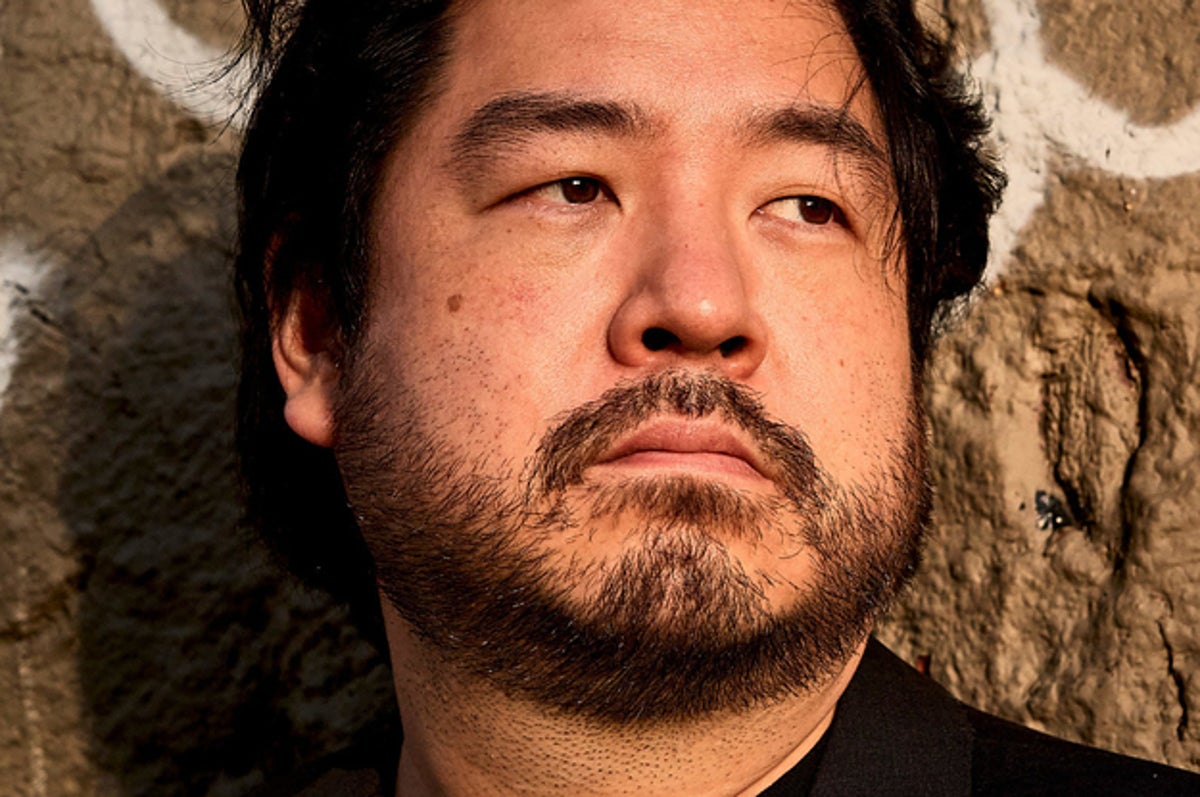
[ad_1]
By the time Christopher Ahn signed on to the mission inside North Korea’s embassy in Madrid, the plan was already finalized. Other people had mapped out how to restrain the staff, how to hoover up any useful intel materials, and most important, how to make it look like the diplomat they were grabbing was being kidnapped rather than defecting — a fiction that would spare his relatives back home from brutal retribution.
The plan had been devised by members of Cheollima Civil Defense, a secretive group set up to help defectors from North Korea escape as part of a bigger plan to take down the Kim dynasty. But Ahn was no mercenary for hire. He was a volunteer who had pitched in on tamer missions by soothing the fears of would-be defectors worried about what might happen if they broke free. He had landed in Spain that very morning knowing nothing other than that the group needed his assistance.
Inside the embassy’s basement hours later, the group received an unwelcome surprise: The diplomat spooked and changed his mind. He wouldn’t be defecting after all. Ahn and the others slipped out of the embassy and into getaway cars.
Back in Los Angeles several weeks later, Ahn welcomed two FBI agents into his home and told them the story over tea and homemade macadamia nut and white chocolate cookies. Ahn figured the FBI wanted the details for its own intelligence purposes, since Cheollima’s founder frequently met with the same agents to relay information from the group’s operations around the world. Or perhaps it wanted to help keep him safe — a notion reinforced soon after the meeting, when the agents warned him that they had credible intelligence that the North Korean government now wanted to assassinate him.
A few days afterward, Ahn went to the Cheollima founder’s apartment to drop off some boxes. US Marshals were waiting inside for the founder, but arrested Ahn instead.
Spanish authorities were treating the incident like a real kidnapping and had targeted Ahn as a key conspirator. More surprising still, the FBI was helping the Spanish prosecutors. A federal judge in Los Angeles will soon rule whether Ahn should be extradited to Madrid, where he faces up to 24 years in prison on charges of illegal entry, assault, illegal confinement, and being part of a criminal organization.
Spanish authorities pointed to the kidnapping paraphernalia that Cheollima left behind, including balaclavas and fake guns. They have also obtained sworn testimony from North Korean diplomats inside the embassy, including the would-be defector, who said the Cheollima men attacked the diplomats, and that he had not given consent for the mission and had never harbored any desire to escape his country.
Ahn and Cheollima members pointed out that this is exactly what you’d expect him to say, given the risks he faces back home. The group was responding to a legitimate plea for help, they said, and would never try to force someone to leave against their will — which they proved when they backed off after the diplomat changed his mind. “Would anyone raid an embassy hoping to persuade someone to defect?” Ahn said. “No way.”
Cheollima had pulled off high-octane missions before, including months earlier when a diplomat in North Korea’s Rome embassy told his colleagues he and his wife were going for a walk, then ducked into a waiting car nearby. Still, the Madrid operation was a risky escalation for the group and for its founder, an activist-turned-revolutionary named Adrian Hong.
But Ahn did not mastermind the kidnapping ruse. A BuzzFeed News investigation — based on accounts from members of the group and others familiar with the events, as well as Spanish court documents and testimony from law enforcement — shows that Ahn was in fact a helping hand who tagged along on the premise that the diplomat wanted to flee the Kim regime. Yet Ahn has been swept up in a delicate geopolitical incident involving multiple Western governments, an infamously repressive authoritarian government, and an independent grassroots network openly plotting its demise.
Spanish authorities believed Cheollima was acting on behalf of or in concert with US intelligence, but their American counterparts denied any connection, according to a person familiar with the Spanish prosecution. Those denials helped precipitate a decision to bring charges, with some on the Spanish side believing the US wouldn’t allow any Cheollima members to be extradited, which would prove that they were intelligence agents.
But the Department of Justice is pursuing extradition for Ahn, who is the only member of the group in custody. The others, including Hong, are in hiding. The DOJ, the FBI, and Spanish law enforcement all declined to comment.
At the time of his arrest Ahn was about to launch a food supplement startup. It has been dashed to pieces, and he now wears an ankle monitor and can’t venture out at night or more than 15 miles from his home. The judge in his case has said he appears to be a “good and honorable man.” Ahn’s lawyer has argued that extraditing him to Spain puts him at a higher risk of assassination because Spain has diplomatic relations with North Korea, making it easier for North Koreans to travel to Madrid to target him. But under the US extradition treaty with Spain, the Justice Department must send him to Madrid if there is probable cause — a low burden of proof — to bring him on trial there for crimes that would also be crimes in the US.
Ahn, 40, said he had jumped on a plane to Madrid on short notice for the same reason he had participated in other Cheollima missions: to help people. “I’m just a guy who was trying to do the right thing,” he said.
Philip Cheung for BuzzFeed News
Christopher Ahn poses for a portrait at Lafayette Park in Los Angeles.
As a kid, Ahn didn’t think much about North Korea. His parents, who moved to the US from South Korea before he was born, taught him to assimilate as much as possible in American culture. His mother, aunt, and grandmother kept his Korean identity alive with songs, fables, and traditional food such as beef radish soup and omurice. But he grew up like any American boy in a suburb of Los Angeles, playing baseball and eating apple pie.
In the 1990s, his father Young Chul Ahn, a former US Air Force radar technician, started a dressy trouser company, called Zannini to evoke high-quality Italian artisanship. He struck deals with Chinese manufacturers, and things were going well until he began having stomach troubles. A biopsy came back with strange results and another was ordered. Stomach cancer. Four days later, he died, leaving 17-year-old Christopher as the man of the house.
Ahn and his mother needed to get the trousers out of China for the family business to survive, so they didn’t tell the factory owners about Young Chul’s death for seven months. Ahn attended high school and ran the company by night, telling the Chinese factory owners that his father was away and had empowered him to make decisions in the meantime. When the product finally made it to Los Angeles, Ahn and his mother flew to China to come clean. The factory owners agreed to continue working with Ahn and his mother in honor of his father.
After high school, Ahn joined the US Marine Corps Reserve. “I wanted to find the fastest way of becoming a man,” he said. While in boot camp, his mother still sent clothing swatches for him to make decisions about Zannini products. After several months of training, Ahn attended the University of California Irvine, studying political science. In 2005, a year after graduation, Ahn’s unit deployed to Iraq where he served as an intelligence analyst in Fallujah.
Courtesy Christopher Ahn
Christopher Ahn during his deployment to Iraq
In his downtime, Ahn told others the story of how his aunt was saved by a US soldier during the Korean War. His grandmother was fleeing Seoul with her two daughters when she lost track of Ahn’s aunt, who was just a toddler. Finding the soldier, she could only say in English, “Baby, baby!” The soldier understood and helped her find the child.
“That guy completely changed our lives,” Ahn said. “Our family looks at that soldier as a true hero.”
After the Marines he spent time in Washington, D.C. He joined a veterans advocacy group run by David Bellavia, the only living Medal of Honor recipient. Bellavia told BuzzFeed News that Ahn changed his views on the Iraq War and what it meant to be a soldier. “I looked at the enemy as someone I had to pacify by killing them,” Bellavia said. “For him, it was always about the people who were victimized. I’ve never met a person who wore the uniform who had so much empathy.”
Funding dried up after the 2008 financial crisis and Ahn found himself trying to figure out what to do with his life. That’s when a friend introduced him to Adrian Hong, a charismatic and supremely confident 25-year-old who was also trying to sort out his future.
Hong had created a major humanitarian group, Liberty in North Korea, while a Yale student. He had a day job as a consultant to startups, but Hong was becoming increasingly convinced that no country or organization on earth was going to do anything about the devastating conditions millions of North Koreans were forced to endure in the world’s most totalitarian state.
He’d already had some hair-raising run-ins, including getting arrested in China trying to help six North Koreans escape in 2006. He was released after pressure from U.S. officials. In a rare move, the North Koreans were also freed — usually China sends escapees back over the border, calling them “economic migrants” rather than asylum-seekers.
Ahn didn’t typically seek out such adrenaline-fueled exploits. “He’s not someone I think of as a door kicker,” a classmate from the Darden School of Business at the University of Virginia told BuzzFeed News. “He’s the person you can rely on to listen to you, a big heart kind of guy.”
But Ahn felt inspired by Hong’s sense of purpose. Ahn was headed to Darden, but he told Hong to stay in touch and let him know if he could ever help out.
Nearly a decade later, Ahn was at a bar at the Z Hostel in Manila — on vacation by himself after a friend pulled out at the last minute — when his phone rang.
“Where are you?” Hong asked. When Ahn told him he was in the Philippines, Hong was thrilled. Ahn could get to Taiwan faster than anyone else in the loose network of volunteers Hong called Cheollima Civil Defense, after a mythical flying horse of Korean lore. Hong had evolved from advocate to instigator, sending anti-Kim propaganda into North Korea and building the beginnings of a government in exile. He was particularly inspired by Libya’s opposition movement against Muammar Gaddafi, which he learned about in person during the 2011 civil war there. Hong and Ahn stayed in touch throughout this time, but Ahn had only attended occasional Cheollima meetings and had never been involved in any major activities.
It was February 2017. The day before Hong called Ahn, two young women smeared a nerve agent on the face of Kim Jong Nam, the half brother of North Korea’s leader, at the airport in Kuala Lumpur. Jong Nam had lived outside of the country for years and hadn’t shown any signs of wanting to contest his half brother’s claim to rule the country, but North Korean agents recruited the women and oversaw the assassination nonetheless.
After Jong Nam was killed, his son Kim Han Sol had contacted Hong for help, telling him that their usual police guard in Macau had disappeared and they feared for their safety, Hong told Ahn, according to Ahn. With his father gone, Han Sol was the only one from that bloodline who could legitimately claim to be descended from Kim Il Sung and Kim Jong Il. Hong told them to get to Taiwan, relatively neutral ground, while he sorted out a country to offer them asylum. And he asked Ahn to buy their tickets and meet them there as an escort. Ahn caught the next flight to Taipei.
Courtesy Free Joseon
Ahn with Kim Han Sol in Macau in 2017
Arriving from Macau, Han Sol greeted Ahn in the airport with the codename “Steve.” Ahn brought them to a lounge. He spoke softly to Han Sol’s mother in Korean and gave his iPad to Han Sol’s teenage sister to watch Netflix.
Finally, word came through that the Netherlands would grant them asylum. Ahn bought another round of tickets on his credit card and took the family to the gate, but they were prevented from boarding by an airport official who was alarmed to see their North Korean passports.
“People say we’re the Underground Railroad, but it was really just me buying tickets with my credit card on Expedia,” Ahn said.
Within hours, two men identifying themselves as being from the US CIA showed up and asked to speak to the family. And after more than a day of waiting, the airport authorities agreed to let the family travel to the Netherlands as planned. Ahn bought yet another set of round-trip tickets.
A team from Cheollima, including a lawyer specializing in political asylums, waited at the airport in Amsterdam, but the family never came out of customs. Hong told Ahn that he believed the CIA interdicted and took them to an undisclosed location.
The mission thrilled Ahn, and he felt it reflected Cheollima’s compassionate intentions. Despite the mysterious look of Cheollima’s website, which included ciphers such as “Golden Bell Forsythia 764099 383642 708027 021412 345034,” Ahn said most of the members he met were “yuppies” doing their best to help people.
“They’re good kids who listened to their parents, got good grades, good jobs and followed the rules,” he said. “They’re people who believe individuals can get together and make a difference in the world… It’s not #idealism, it’s real.”
Hong came across as the reluctant leader, idealistic and motivated but burdened by how much he’d taken on, Ahn said.
“Adrian was exhausted from this,” Ahn said. “He was broke from it, but he felt if he didn’t do it, nobody else would.”
Philip Cheung for BuzzFeed News
Ahn poses for a portrait at Lafayette Park in Los Angeles.
In February 2019 a message popped up on Ahn’s Signal. There was a mission in Spain: Was he up for it?
Since Taipei, Ahn had done smaller missions here or there, but nothing major. He declined to disclose details, but said it involved helping calm the fears of would-be defectors in Europe. He initially turned the new operation down, but decided at the last minute he could spare a three-day weekend.
He touched down in Madrid on Feb. 22 without the slightest clue what this mission was about. He didn’t even register how sensitive a moment it was: Donald Trump was just five days away from a meeting with North Korean leader Kim Jong Un in Vietnam.
Ahn met up with members of Cheollima at an Airbnb. He had a shower and a sandwich before getting a full briefing from Hong, who was personally leading the mission.
The senior-most official at the Madrid embassy, a commercial attaché called Yun Suk So, had gotten word to the group that he wanted to defect alongside other members of the embassy, Hong told him. Hong and other members of the embassy had been preparing for weeks, and Hong had already visited the embassy under the guise of Matthew Chao, the head of a made-up company in Dubai called Baron Stone Capital.
Only a few months earlier, in November 2018, Cheollima had helped rescue the North Korean ambassador to Italy, Jo Song Gil, and his wife from Rome in a mission Ahn was not involved in. But their daughter was left behind in the chaos of their dash for freedom. Not long afterward she was bundled back to Pyongyang, where she faced a life of almost certain misery as the child of traitors. In North Korea, if one member of a family is accused of a crime or of disloyalty, three generations of their family are imprisoned in state-run camps as punishment.
Diplomats live in constant fear of being considered disloyal. They always travel in pairs to meetings, so they can keep an eye on each other. So feared he and his family were being watched at all times, including in the embassy.
Hong’s solution was to create the illusion of a kidnapping. If the mission was successful, the group wouldn’t take any kind of public credit for it, and the North Korean government would not be sure where to direct its anger. In addition to the imitation guns and balaclavas, Hong and another member had bought Mace spray, crowbars, plastic restraints, and metal handcuffs. They had also bought candy and toys for So’s son.
The priority was getting the attaché, his wife, and his son out of the embassy, but the group had some secondary objectives, too. If possible, they would try to persuade other officials to join them. And they would take advantage of being inside the embassy — technically North Korean territory — to create some anti-regime propaganda videos. Any intelligence gathered would be a bonus.
“I was shocked by the intensity of the plan,” Ahn said. It was the most “kinetic” operation he’d heard of since the founding of the group, but he felt reassured that they were aiming to get in and out in minutes, rather than stick around inside for hours. After hearing about the Italian operation, it made even more sense to stage a kidnapping to protect defectors, he said.
Ahn wasn’t planning on doing anything too physically taxing: He had a fractured wrist at the time, and he has back pain so severe that he sometimes uses a cane. The Department of Veterans Affairs has given him a 60% disability rating from the wear and tear of the Marines.
The group had been planning for weeks, so Ahn said he left the operational details to the other members. The main thing on his mind was creating a big fish barbecue that night at the Airbnb to welcome the North Koreans and celebrate their bravery.
“I was working on the grocery list,” he said.
Just before 4:40 p.m. the same day he landed, Hong, Ahn, and eight other Cheollima members stood at the door of the North Korean embassy. Several other members were waiting nearby in cars for the exfiltration.
Hong, wearing a black suit and a tie with white polka dots, pressed the buzzer, telling the groundskeeper he had an appointment with So, the attaché. The groundskeeper let him inside to wait near the door, but when he left to find So, Hong pushed open the door for the rest of his crew to enter.
Once they made it inside, the balaclavas came out, and they rounded up the embassy’s personnel and placed them in an office with plastic restraints binding their wrists.
“Our concern was whether there were video cameras inside the embassy,” Ahn said. “The idea was to perform in front of them at the start.”
But it quickly became clear that there was no internal surveillance and Hong said in English, “Transition, transition.” The team understood that to mean they could change their demeanor from mysterious intruders to coolheaded rescuers.
Hong and another member went with So into the basement to discuss the details of his defection and whether others from the embassy could be persuaded to join his family, Cheollima members said. BuzzFeed News has reviewed a partial video clip from the basement in which the would-be defector is laughing and appears to be relaxed; Cheollima hasn’t released the whole video.
One member of the group stood guard with So’s wife and son, while others went room to room checking for anyone else in the embassy’s many rooms and closets. The building was largely empty — except the propaganda room, which was full of pictures of Kim Jong Un and mantras of the regime.
“It was depressing,” Ahn said. “These were the elites of North Korea and they had nothing.”
Then came the misstep that would threaten the whole group’s survival. They hadn’t noticed the wife of another senior official, who believed she was in mortal danger after hearing South Korean-accented men rush into the embassy, according to her court testimony.
She escaped onto a terrace and jumped to the ground below, injuring her head and leg. Managing to limp out a backdoor to the street, she hailed a passing motorist, who took her to a clinic and called the police. Using Google Translate, officers realized she was saying the embassy was under attack.
Unaware of any issues, Hong and other members believed the mission was nearly finished. One of the Cheollima members was himself a North Korean defector who had earned asylum in the U.S., and they filmed him entering the embassy half an hour after Hong and others, crying as he touched North Korean soil. They filmed another member pulling down photos of Kim Jong Un and Kim Jong Il and smashing them on the floor. North Koreans are inculcated with the belief that their leaders are godlike and undefeatable. The idea was to release the footage later, as anti-regime propaganda, without mentioning where it was filmed.
Then the police pressed the buzzer. Hong, his long hair tied into a bun, put on a “Dear Leader” pin with Kim Jong Un’s face on it and answered the door. Hong was born in Mexico to South Korean missionaries, so he spoke enough Spanish to persuade the officers there were no issues.
When the officers left, other Cheollima members congratulated him. But Hong was confused: What woman were the police referring to? Speaking to the attaché, it soon dawned on them that an actual resident of the embassy had escaped and called the police.
The phones began ringing nonstop. The cavernous rooms, with tiled floors and few furnishings, amplified the sound to the point where it was hard to think. Soon Hong came up from the basement with bad news. News of the escapee, as well as the ringing phones, had deeply unnerved So, who believed North Korean authorities would be coming soon. He called off his own defection and asked Cheollima to leave right away.
It was dark out by now.
Ahn and the group member who’d been filmed entering the embassy crying took off in a car by themselves. Hong and another member scaled the wall to get to the street behind the embassy, where they got into an Uber, which Hong had ordered using the fake name Oswaldo Trump. The group left behind the imitation guns, balaclavas, handcuffs, and plastic wrist restraints.
Ahn and his companion were on their own with a cellphone that had only 2% of battery left, just enough to coordinate with other members of the group to pick up their passports in a bush in a designated area. From there, every group made their own way to Portugal over land so they could fly to the U.S.
After midnight the men found a taxi driver and Ahn persuaded him in broken Spanish to drive them six hours to Porto, saying they needed to get there for his brother’s wedding. They drove through the night and managed to book flights home. The rest of the group arrived in New York for a debriefing, but Ahn had meetings to attend on Monday for his food supplement startup, so he flew to Los Angeles.
The plan was to immediately inform the FBI. Hong later told members of the group that the agents were wide-eyed as they heard the story but gave no views on any consequences, asking for the names of everyone involved.
Hong refused, but he did hand the agents a trove of intelligence from a foil-lined communications room at the North Korean embassy, including a Huawei mobile phone, USB sticks, two computers, and two hard drives they’d grabbed before fleeing.
For weeks, the group was cautiously optimistic that their failed mission wouldn’t have any further consequences. When Hong flew from New York to Los Angeles, where he also lived, Ahn picked him up at the airport and they discussed the case. “If only we had known about the wife,” Ahn recalled Hong saying.
The FBI pressed for more information and Hong asked if Ahn would speak to them as well, believing they were checking the details to be able to better protect the group from any confusion or retribution. Ahn agreed, figuring he would help clear up any misunderstandings.
Meanwhile, Hong renamed Cheollima as Free Joseon on March 1, 2019, saying that “tens of millions of our fellow Koreans remain enslaved by a depraved power ruled by a corrupt few made wealthy by the toils of many.” Free Joseon declared itself the provisional government preparing for the end of the Kim regime.
Philip Cheung for BuzzFeed News
Ahn displays his ankle monitor.
Unbeknownst to the group at the time, the Spanish authorities had identified the men involved in the Madrid mission and gathered testimony from the North Korean diplomats, who told prosecutors that the Cheollima volunteers had been beaten and terrorized them. So told prosecutors the men had raided the embassy and tried to force him to defect, in part by telling So that the North Korean government was about to collapse.
Ahn said that’s untrue, but believes the men felt pressured to show they’d put up a fight to avoid retribution.
Alejandro Cao de Benós, a Spanish entrepreneur with long ties to North Korea, told BuzzFeed News that all of the people in the embassy except So had been sent back to Pyongyang not long after the event.
By the end of March, the Spanish court removed a secrecy order on the case revealing another detail: The FBI had been cooperating with the Spanish investigation and had informed them that Hong had handed them embassy material.
Around the same time, the FBI — without disclosing it was working with the Spanish authorities — told Hong and Ahn that the US government had credible intelligence that the North Korean government wanted to assassinate them. The FBI later confirmed the assassination threat with Ahn’s lawyers, court documents show.
Yet nothing happened right away. Hong told Ahn he was breaking his lease and moving into another house to avoid reporters and any would-be assassins. A few weeks later, Hong asked Ahn whether he’d like a surveillance camera to put up outside his house for protection — Hong had ordered a few too many. “Take what you want and drop the rest at my old apartment,” Hong told him, according to Ahn.
Ahn headed over to the apartment and opened the door with a key Hong had given him. Standing inside were several startled US Marshals, who immediately arrested him.
“I wasn’t worried at first,” Ahn said. “I kept saying, ‘can somebody please call the FBI or State Department to clear this up. There’s obviously been a mistake.’”
“I thought I’d be home for dinner,” he said. Instead, he was booked and placed in the Metropolitan Detention Center in Los Angeles, where he spent three months.
The judge granted him bail despite the opposition of the U.S. Department of Justice, pointing out that much of the evidence against him came from officials of a country that doesn’t have diplomatic relations with the U.S. Family members put up their homes to meet the nearly $1.3 million bail. Another condition: absolutely no contact with Free Joseon.
For the next year and nine months, he was under full house arrest. He couldn’t even help his wife bring groceries from the car.
Late last year, the judge modified his bail so that he could travel in a restricted zone from 8 a.m. to 8 p.m., which allows him to care for his mother, who has a disease called trigeminal neuralgia that causes extreme pain in the face, and his 99-year-old grandmother, at their home nearby.
More than two years after Madrid, Ahn said his life has been upended without any end in sight. His career is on hold, some friends have turned their backs on him, and he and his wife have put off having children until his situation is resolved.
But he has no regrets. “I try not to feel bitter,” Ahn said. “What it comes down to is if someone asks for help and I have the capability of helping, then I don’t want to be the type of guy who says no.” ●
[ad_2]
Source link




